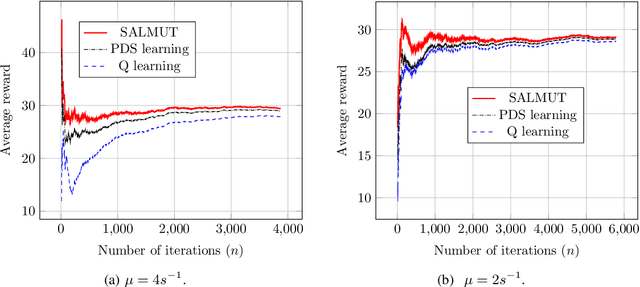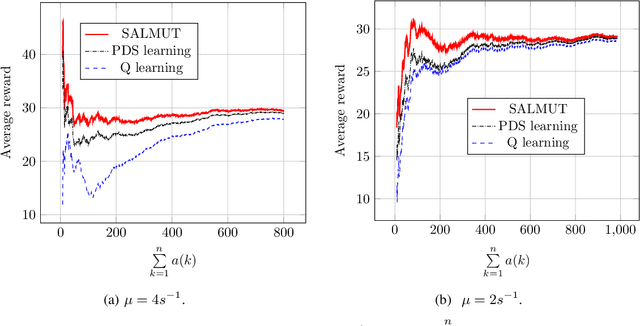Arghyadip Roy
Hellinger KL-UCB based Bandit Algorithms for Markovian and i.i.d. Settings
Sep 14, 2020

Abstract:In the regret-based formulation of multi-armed bandit (MAB) problems, except in rare instances, much of the literature focuses on arms with i.i.d. rewards. In this paper, we consider the problem of obtaining regret guarantees for MAB problems in which the rewards of each arm form a Markov chain which may not belong to a single parameter exponential family. To achieve logarithmic regret in such problems is not difficult: a variation of standard KL-UCB does the job. However, the constants obtained from such an analysis are poor for the following reason: i.i.d. rewards are a special case of Markov rewards and it is difficult to design an algorithm that works well independent of whether the underlying model is truly Markovian or i.i.d. To overcome this issue, we introduce a novel algorithm that identifies whether the rewards from each arm are truly Markovian or i.i.d. using a Hellinger distance-based test. Our algorithm then switches from using a standard KL-UCB to a specialized version of KL-UCB when it determines that the arm reward is Markovian, thus resulting in low regret for both i.i.d. and Markovian settings.
Online Reinforcement Learning of Optimal Threshold Policies for Markov Decision Processes
Dec 21, 2019


Abstract:Markov Decision Process (MDP) problems can be solved using Dynamic Programming (DP) methods which suffer from the curse of dimensionality and the curse of modeling. To overcome these issues, Reinforcement Learning (RL) methods are adopted in practice. In this paper, we aim to obtain the optimal admission control policy in a system where different classes of customers are present. Using DP techniques, we prove that it is optimal to admit the $i$ th class of customers only upto a threshold $\tau(i)$ which is a non-increasing function of $i$. Contrary to traditional RL algorithms which do not take into account the structural properties of the optimal policy while learning, we propose a structure-aware learning algorithm which exploits the threshold structure of the optimal policy. We prove the asymptotic convergence of the proposed algorithm to the optimal policy. Due to the reduction in the policy space, the structure-aware learning algorithm provides remarkable improvements in storage and computational complexities over classical RL algorithms. Simulation results also establish the gain in the convergence rate of the proposed algorithm over other RL algorithms. The techniques presented in the paper can be applied to any general MDP problem covering various applications such as inventory management, financial planning and communication networking.
A Structure-aware Online Learning Algorithm for Markov Decision Processes
Nov 28, 2018


Abstract:To overcome the curse of dimensionality and curse of modeling in Dynamic Programming (DP) methods for solving classical Markov Decision Process (MDP) problems, Reinforcement Learning (RL) algorithms are popular. In this paper, we consider an infinite-horizon average reward MDP problem and prove the optimality of the threshold policy under certain conditions. Traditional RL techniques do not exploit the threshold nature of optimal policy while learning. In this paper, we propose a new RL algorithm which utilizes the known threshold structure of the optimal policy while learning by reducing the feasible policy space. We establish that the proposed algorithm converges to the optimal policy. It provides a significant improvement in convergence speed and computational and storage complexity over traditional RL algorithms. The proposed technique can be applied to a wide variety of optimization problems that include energy efficient data transmission and management of queues. We exhibit the improvement in convergence speed of the proposed algorithm over other RL algorithms through simulations.
 Add to Chrome
Add to Chrome Add to Firefox
Add to Firefox Add to Edge
Add to Edge